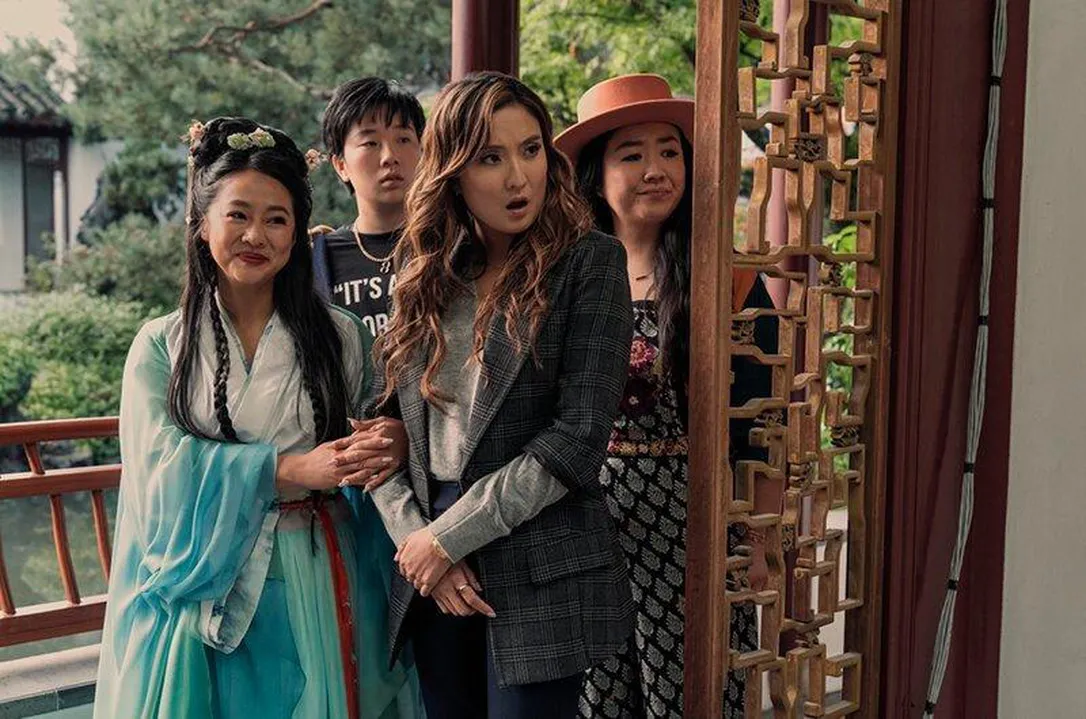
‘Joy Ride’ is an R-rated comedy about four Asian-Americans in their 20s taking a ridiculously chaotic trip through Asia, in theatres now. It’s a hilarious caper that’s next-level raunchy, like all good summer girl’s trip movies should be. Featuring rising stars Ashley Park (from “Emily in Paris”), Stephanie Hsu (from “Everything, Everywhere All at Once”), Sherry Cola and Sabrina Wu, this latest addition to the friends-trip-gone-wrong canon is getting rave reviews, including a 91 per cent Rotten Tomatoes rating.
One review in particular has the meme machine in overdrive, though: Jackson Murphy of Lights Camera Jackson deemed the film “embarrassing,” stating it “objectifies men, targets white people.” This prompted director Adele Lim to clap back that she’d like to wear that phrase on a T-shirt. Hilarious stuff.
The Kit’s Renée Tse watched an early Canadian screening of ‘Joy Ride’ with Lainey Lui, eTalk senior correspondent, The Social co-host and LaineyGossip.com founder. They laughed, they cried, then they had a deep discussion about exactly how ‘Joy Ride’ represents Asians in a refreshingly radical way. Here, Lui’s take on the summer’s best road trip film.
‘Joy Ride’ defies stereotypical depictions of Asians
“It’s one of the few times in a western movie that Asian women are being raunchy, rude, disrespectful and messy, and that directly attacks the stereotype of what Asian women should be. The meek Asian subservient stereotype? That’s out the door. The uber polite, mannered, nonassertive Asian? That’s out the door, too.
You have the stereotype of the overachieving Asian, which is Ashley Park’s character (Audrey Sullivan), but it’s juxtaposed by Lolo (Sherry Cola), and she’s a mess. She’s an artist. One of those stereotypes is that in an Asian family you’re only supposed to be a lawyer, a doctor, a banker or whatever, and in a sense, that’s a little bit true, but the movie is very self-aware of all these stereotypes and it actively pushes back against them in a confrontational, provocative way.
As you can see from the reaction of that one critic, that provocation worked. That critic was probably like, ‘I’m not used to seeing my Asian women like this. Sorry, Asian women are raunchy? They’re not subservient and kowtowing to the white person? They’re not being uber respectful to white people? Wait a minute.’”
‘Joy Ride’ dispels the Asian monolith myth
“There was a hilarious moment in the airport where the main cast points out different types of Chinese people from different regions. We’re not a monolith, and we can identify them. ‘Crazy Rich Asians’ did that a little bit, but ‘Joy Ride’ went even deeper. You could hear the different Chinese dialects. The dialects were woven in organically without needing to be explained to the audience. If you know, you know, but it doesn’t affect the experience if you don’t know.
The film authentically represents what you encounter in China from block to block or conversation to conversation. You’re going to hear Mandarin spoken slightly differently, and you’re going to hear a different dialect, and if you have the ear for it, you’re going to know.”
On racism in families
“In Lolo’s hometown, you meet her aunties and uncles and all the villagers. That’s a snapshot of what it’s like to 返鄉下 (go visit your hometown), and if you’re Chinese, you would know what it means to go back to your hometown. And in your hometown, you’ll have people who are hicks, a little bit.
There was one scene where one of the elders was a little bit racist and Deadeye bluntly calls out, ‘That’s so racist.’ The movie isn’t saying being Asian or specifically Chinese is being better than anybody else, but it’s saying, ‘Hey, we’re messy, and we’re sloppy and we have elders saying inappropriate things, too — even against other Asian people. But this is who we are. We’re complicated and we’re layered.’
‘Joy Ride’ lets women be unapologetically raunchy
“Sherry Cola making those sex sounds in that one scene? That’s the s — t I love. It’s so hilarious to me that they went there. I also thought Stephanie Hsu did such a good job when she was so horny that you could see it in her facial expressions — she couldn’t hold herself back. That is one hundred per cent the level of horny that I want to see, not just from an Asian movie, but from a movie about women.
In every culture, there’s a stigma against women loving sex, wanting sex and being horny, needing to rub one out. And it’s not just sex raunch — the drug scene on the train is the kind of raunch you see with men all the time, like in ‘The Hangover.’ Those guys did three movies in which the whole film was getting wasted and doing s — t they don’t remember. I can’t remember if I’ve seen a movie where four women get high as f—. Not drunk, I’m talking about cocaine. And nobody feels guilty about it. Nobody needed to apologize or felt bad about themselves. Ashley Park’s character basically said she needed some more. It was unapologetic. I can’t remember seeing that level of excess from a women-led cast.”
On gender identity and queerness
“I think it was really important to have a non-binary character like Deadeye (Sabrina Wu) in the mix. But it wasn’t done in an obvious way; there was no point in the movie where we were like, ‘Hey, you’re non-binary.’ They didn’t need to do a side story and figure out their identity. It was, ‘Deadeye is non-binary,’ and that’s it. And in an Asian movie? We’re not seeing a lot of non-binary or queer people. All of our cultures, but mostly Asian cultures, have a very complicated relationship with queerness. It’s not even tolerated. We don’t talk about it. And here’s Deadeye and they’re the most hysterical character. They covered Deadeye’s non-binary-ness through K-pop, like, ‘This is a community that accepts me for me.’ It was a testament to why people love K-pop.”
On what’s next
“I think true progress is that we don’t have to categorize what comes next and check boxes. It should be whoever wants to tell a story should tell that story. Period. But I guess the most obvious and simple answer to that question is we need a sequel. They built it in, saying they should make this an annual girls trip. Where do the four of them go next? Who’s going on this next adventure where they can get up to their hijinks again?
Same with ‘Girls Trip.’ Shout out to ‘Girls Trip’ because that was such a great movie, and it doesn’t have a sequel and we should have it. Why is ‘The Hangover’ getting 80 sequels and Girls Trip hasn’t gotten one and ‘Joy Ride’ hasn’t gotten one? People love this movie.”
JOIN THE CONVERSATION
does not endorse these opinions.







:format(webp)/https://www.thestar.com/content/dam/thestar/entertainment/movies/2023/07/12/this-is-the-level-of-horny-that-i-want-to-see-lainey-lui-talks-about-how-the-raunchy-film-joy-ride-is-a-game-changer/inline_2_joy_ride.jpg)
:format(webp)/https://www.thestar.com/content/dam/thestar/entertainment/movies/2023/07/12/this-is-the-level-of-horny-that-i-want-to-see-lainey-lui-talks-about-how-the-raunchy-film-joy-ride-is-a-game-changer/inline_3_joy_ride.jpg)







